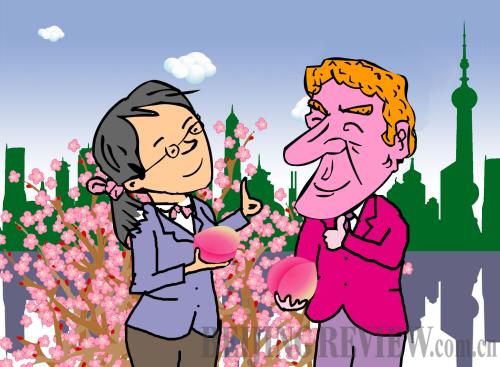|
 |
|
(LI SHIGONG) |
"Did you know that my hometown, Shanghai, is famous for peaches," Tingting asked. "Peaches?" I replied. "I thought Shanghai was a legendary seaport," I said.
"That's also true—nowadays," she replied. "But as a harbor town, Shanghai had humble origins, tracing back to a small fishing village called Hudu, founded during the Tang Dynasty (618-907). In 1074, during the Song Dynasty (960-1279), it was only a small market town located between the confluence of the Songjiang and Huangpu rivers.
During the Song, Yuan (1206-1368) and Ming (1368-1644) dynasties, rice became a dominant crop along the Yangtze Valley, but Shanghai soil was too brackish and sandy to support rice cultivation. Instead, salt and cotton came to be key agricultural products, and they brought considerable wealth to the region. Peaches (shui mi tao) also thrived in Shanghai soil. When one local, Zhang Suowang (1556-1635), advertised Shanghai peaches were second in taste only to fresh lychees, Shanghai became established as a quality fruit-growing region."
"Much Chinese mythology and lore is associated with fruits," I said.
"Yes; fruits are crucial symbols to Chinese. The importance of peaches illustrates the way local food crops put forth the idea of Shanghai as a cosmopolitan place in the Chinese realm, long before Shanghai became an international seaport," Tingting replied.
"But peaches?" I protested.
"The symbolism of the peach is closely connected to immortality. Over 2,000 years ago, the mythical Queen Mother of the West chided Emperor Wu of the Western Han Dynasty (202 B.C.-A.D. 9) for presuming that he could grow her peaches of immortality located in the royal Kunlun Mountain gardens," Tingting said. "Via literature, peaches joined other mythical fruits as immortals' foods. Aristocracy living in ancient China around Shanghai used peach symbolism to represent their aspirations to create a cosmopolitan empire. Peaches evolved into exotic, unknown things that people yearned for, in addition to representing the quest for immortality."
"So, Shanghai's honey nectar peach put the city on the map, creating an ancient, distinctive urban identity?" I asked.
"Correct; in 1683, local elites published newsletters extolling the quality of Shanghai peaches. While cotton remained Shanghai's most lucrative crop, the peach provided a compelling image of Shanghai as a city located in the crossroads of Chinese history and geography. Later, in the early 1800s, a local merchant published Chu Hua's Treatise on the Honey Nectar Peach. This work suggested that Shanghai was indeed worthy of a visit by immortals. He described the honey nectar peach with its single-petal blossom. The blooms are stunning. The fruit has an unearthly fragrance, excellent color and attractive appearance.
The poet Chen Wenshu wrote a preface to Chu's work; he linked Shanghai peaches to other mythically significant and marvelous fruits: crab-apples from Huayang; pomegranates from Dunxun; dates from Pangtang; and streaked apricots from Penglai. Such fruits belong to ancient literary traditions that spread word about delicious and magical fruits via food writing, scholarly treatises, poetry, and personal correspondences. Poets often wrote about fruits as enticements and marvels, while Taoists endowed fruits and their trees with cosmic properties. Crab-apples, native to Sichuan Province, offered immortality and protected communities from pestilences. Pomegranates, native to Myanmar, symbolized fertility and medicine. Pangtang and Penglai were mythical places, where the Queen Mother of the West had orchards bearing fruits once every 10,000 years which Emperor Wu coveted but was denied. But Shanghai now had her peaches!"
"Who grew them?" I asked.
Tingting replied: Locals who wanted to enhance the city's reputation. In the 15th and 17th centuries, when Shanghai was considered a minor port city, they began building gardens featuring peaches. Shanghai's elites vied to build gardens that were cultural equals to other notable cities, such as Suzhou, Hangzhou and Yangzhou. Significantly, early Ming gardens in these other cities were valued both for their beauty and for their productivity. Because of this, the Chinese term for garden (yuan) could translate as either garden or orchard. During the second half of the Ming Dynasty, however, aesthetic spaces were more valued, and gardens became places of beauty and pure luxury. But in Shanghai city residents clung to the hybrid idea of garden/orchard. By retaining this idea, Shanghai residents situated their city into a cultural genealogy that dated back to the time of Emperor Wu of the Western Han Dynasty. During the Ming Dynasty, 11 beautiful gardens were constructed. The Gu family built one, called Dew Fragrance Garden; their peach blossoms came to symbolize Shanghai's virtues.
By connecting Shanghai peaches with these fruits, Shanghai became associated with marvelous cosmological purposes, a microcosm of the Chinese realm, a very special place. In this way, local peach cultivation during the mid-Ming Dynasty evolved into an elaborate advertising campaign during the Qing Dynasty (1644-1911), establishing Shanghai's reputation. Long before Shanghai became a seaport, long before foreigners entered this place, Shanghai was known as a sophisticated cultural center among erudite Chinese—all because of our delicious, magical peaches!"
The writer is an American living in China |
